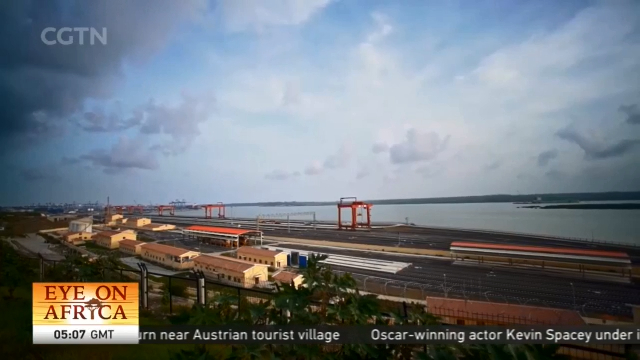
13:36, 23-Aug-2018
China-Africa Ties: An old trade route is renewed
Updated
12:45, 26-Aug-2018
05:12

Thousands of containers leave Guangzhou for African ports every day. It is one of the world's top ten busiest ports, and China's main port connecting Africa. China is investing in African shipping infrastructure as well. And it's not a new phenomenon, but rather builds on a long history of links between the two.
Kenya's Fort Jesus is a UNESCO World Heritage Site. It was built by the Portuguese some 400 years ago to guard the old port of Mombasa. Fort Jesus is now a museum. But most of the artifacts on display are neither European nor African.
SHEM RAPHAEL, CURATOR FORT JESUS MUSEUM "We have a lot of Chinese collections in the gallery and these Chinese collections, some of them we found in the shipwreck. Well, I can say that Chinese goods have been here, more than 400 years before now."
While China – Africa ties have existed for centuries, many believe the best is yet to come.
China is helping to unleash Africa's stored potential, working with local partners on massive construction projects. The modern-day Port of Mombasa is a case in point. It's the busiest seaport on the African east coast. But outdated infrastructure and other aging transportation links are causing bottlenecks in the movement of goods and people.
Huang Xionglin, the deputy general manager of China Road and Bridge Corporation, is overseeing a 10-year contract with the Kenyan government. It's all about rejuvenation and connectivity. Huang's company is operating a new freight terminal at the port, and a 400-kilometer-long railway it built connecting Mombasa to Kenya's inland capital Nairobi, and eventually to landlocked countries in the African interior.
The new railway, which began to haul freight in 2017 is already making a difference. It has cut the trip between Mombasa and Nairobi by four hours, saving both time and money.
"The views, its wildlife outside when you are driving, the pace is enough for you to see the things and take pictures."
"Save a lot of time and it's enjoyable, you can eat, there's toilet there, so everything is just superb."
But Chinese companies are not only the builders and constructors. Chinese professionals are here for the long term, as teachers and trainers. They have 10 years before they hand over the full operation of the railway to local leaders and their crews.
ELIZABETH WANJALA LOCOMOTIVE TRAINEE "I got this opportunity through my university, University of Nairobi. They had a career fair event, so when the company came to the university, I went to attend and they asked me, 'If you had a chance to be trained as an assistant locomotive driver would you do it?' So I accepted the offer because they were willing to train me on the job."
Over the last 30 years, a key to China's own successful development has been its colossal investment in transportation infrastructure. The strategy has not only paid great dividends to China's economy, but Chinese engineering and construction companies have developed world-class expertise that is helping them win contracts aboard.
Project manager Li Wenlan of the Chinese engineering group Wuyi, is overseeing a 25 km highway expansion project in Kenya's capital, Nairobi, that's being financed by the World Bank. With new infrastructure in place, traders in the region will soon be able to better exchange their shipment with China and beyond. Facing ultra-thin profit margins, wholesalers in China and retailers in Africa are coming up with innovative ways to cut the cost of doing business. This is where the world wide web truly lives up to its name.
One of these "trade" facilitators is Amanbo, a Chinese e-commerce platform that has set up demonstration outlets in six African countries, including Kenya and Cameroon. Amanbo also runs a program called AMP – Amanbo Marketing Partner. It's helping train college students interested in becoming Amanbo's campus representatives. Their only tools are a smart phone and the company's APP.
DENNIS KAMAU, STUDENT UNIVERSITY OF NAIROBI "The China products, at least the price is ok, which is affordable to most of the students and most of the people who are willing to purchase. My commission, it's not that bad. I'm able to sustain my living standards, and also to pay my own school fees."
As China continues to evolve its own development path, the made-in-China label is rapidly changing. A new trend is emerging from China that offers even greater potential to spur global trade and bring true shared benefits to Africa.

SITEMAP
Copyright © 2018 CGTN. Beijing ICP prepared NO.16065310-3
Copyright © 2018 CGTN. Beijing ICP prepared NO.16065310-3